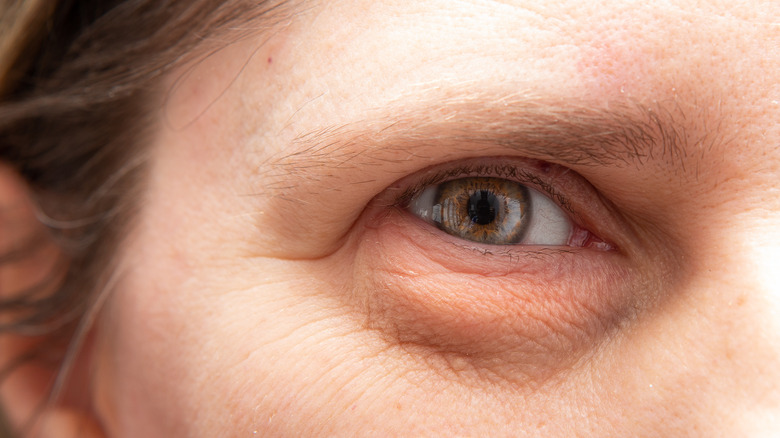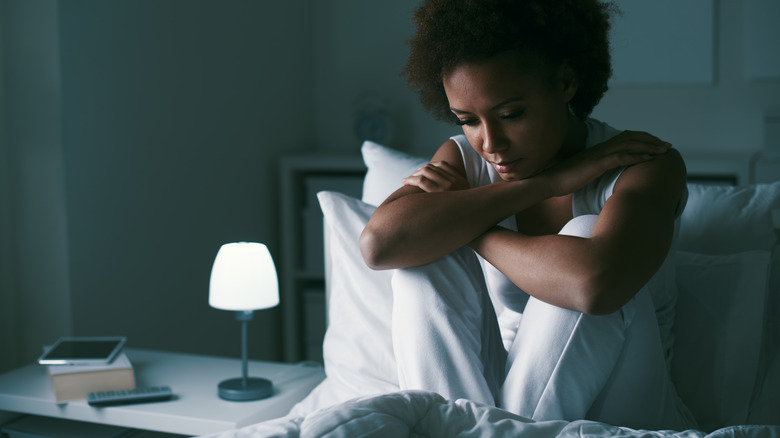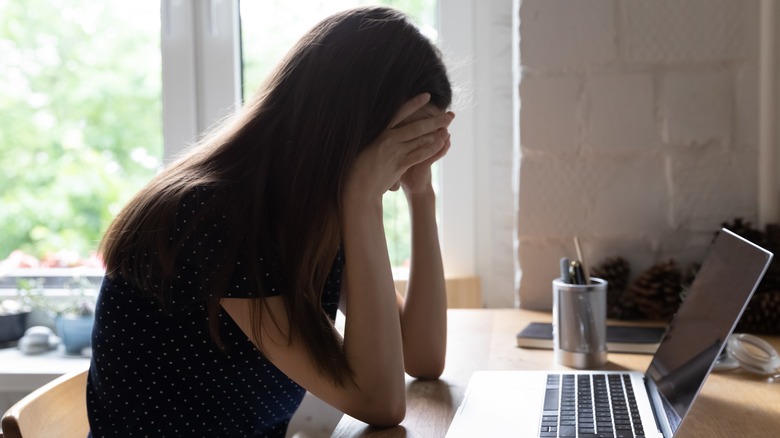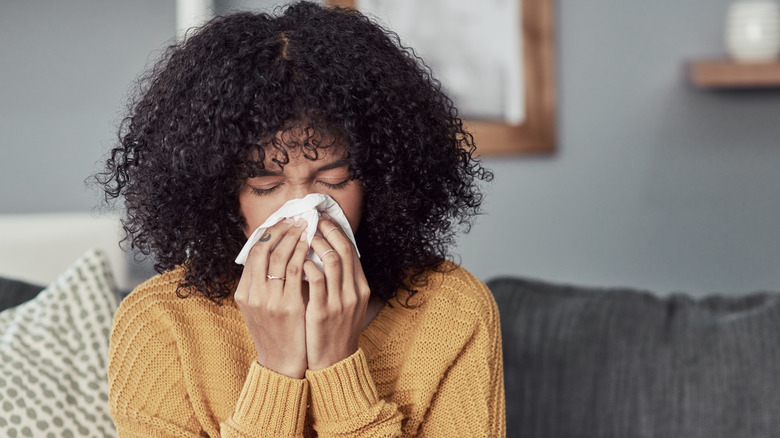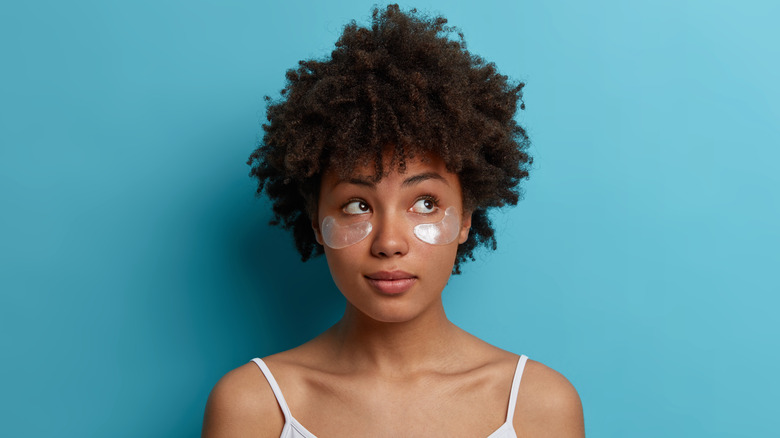Struggling With Puffy Eyes? The Most Common Causes, Explained
We may receive a commission on purchases made from links.
We all have unwanted baggage that we're dealing with, and for many of us, said baggage is taking up residence under our eyes. We've all experienced waking up with puffy eyes, and when it happens, we naturally want to will the swelling to go "poof" as soon as possible.
Unfortunately, getting rid of the puffiness isn't as simple as applying an eye cream or slapping on an eye mask when you sleep. It's not as easy as extending your time in bed a few additional hours, either. There is no single solution for banishing puffiness, because there's a long list of reasons why our eyes decide to balloon from time to time. "Effectively addressing this concern for each patient is much more variable. Just as there isn't a 'one size fits all' cause, there isn't a 'one size fits all' solution," Dr. Kathleen S. Viscusi, dermatologist and co-founder of Dermatology and Surgery Specialists of North Atlanta, explained to Who What Wear.
Puffy eyes don't usually signal an underlying medical problem, but if you frequently deal with it and it's starting to become a bother, getting to the bottom of what's causing it is the first step to remedying it. Here are some of the most common reasons why your eyes can sometimes look swollen.
You haven't been sleeping well
More often than not, your eyes get puffy when you fail to clock in the recommended 7 to 9 hours of shuteye every night. On top of irritability, slower cognitive function, and excessive sleepiness, sleep deprivation will cause your eye bags to be extra bloated, and even darker, too. Board-certified dermatologist Dr. Anar Mikailov explained to Mbglifestyle that it's because when sleep is compromised, hormones that promote fluid retention can go into overdrive. This results in swelling in different places of the body, including your eyes. "Additionally, lack of sleep means less lymphatic fluid available to clear toxins and waste products, so buildup leads to puffiness," he added.
Obviously, you have to commit to a consistent sleep schedule to combat sleep deprivation-induced eye puffiness, but for a short-term solution, the American Academy of Ophthalmology suggests gently pressing a cold compress over the eyes. You may also want to raise your head a bit with a pillow when you're in bed to prevent the fluid from taking up residence around your eyes while you're snoozing.
You've been crying your eyes out
Crying, for all intents and purposes, is a cathartic activity. Whether you're bawling as a result of feeling intense emotions or due to a "The Notebook" rewatch, there's no discounting the fact that it can bring you some form of relief. But while crying can be good for you — healthy even — the tradeoff is you're left with a bright red nose, swollen tear ducts, and puffy eyes. Discovery notes that this is because the tears you generate aren't as salty as the rest of the fluid in your cells, so as a response, they're rerouted to flow through a different tissue to balance it all out.
As mentioned earlier, you can deflate your eyes by using a cold compress, but Dr. Deanne Mraz Robinson, a board-certified dermatologist, also suggested other viable DIY options. "If you're at home, wash your face with cold water or apply an eye mask or a bag of frozen peas from the freezer," she told The New York Times. "If you're out and about, try wetting your fingers with cold water from the sink and then gently pat under your eyes."
You've been munching on too much sodium or downing one too many shots
Ever heard of "sushi face?" It's a term apparently coined by actor Julianne Moore to refer to the state of one's face after eating rolls of sushi. She says that sushi causes her face to bloat the next day, so she avoids consuming it when she has to attend an important event.
Health experts confirm that sushi face is indeed real, and so do sushi eyes. When you're consuming too much junk or sodium (a big ingredient in soy sauce), you can expect your eyes — and the rest of your face — to look puffy the following day. "Soda makes you dehydrated, and when you eat foods that are high in sodium, your body retains the salt and you get puffy, especially under your eyes," dermatologist Michele Green pointed out to Allure. Alcohol apparently produces the same effect, with dermatologist Dr. Judy Hu explaining to Dermstore that booze "causes dilatation of the blood vessels, and where there are dilated vessels, fluid accumulation can occur."
With these in mind, you probably already know the answer to treat puffiness caused by food and alcohol: drinking water. Lots and lots of water.
It's allergy season
Find yourself sneezing frequently? Chances are, your eyes are swollen, too. Allergy flareups are found to also cause eye puffiness, in addition to eye redness and teariness. "Basically, when the allergens hit your eyes, they sort of dissolve in your tears," Dr. Princess Ogbogu, director of the division of allergy and immunology and associate professor at the Ohio State University Wexner Medical Center in Columbus, shared with Everyday Health. "They have contact with the lining of the eye [the conjunctiva], and they react with antibodies that are bound to cells in your eyes."
Taking your usual antihistamines and avoiding allergens are the obvious solutions, of course, but you may also try using steroid eyedrops — but only after your doctor has signed off on it. "Steroid eye drops can work very well when you have allergies; however, if it's used for another condition, it could actually harm and blind you," ophthalmologist Dr. Annapurna Singh of Cleveland Clinic noted. "Always, check with your physician first."
Maybe it's not you; it could be your genes or your age
Take one good look at your family and see if a majority of them also have puffy eyes. If they do, yours are likely caused by genetics more than any other reason. In that case, you can't do much about your persistent puffiness, unless you resort to dermal fillers or other permanent solutions like surgery. "Simply put, they are caused by fat," Dr. Brian Brazzo, oculoplastic surgeon, told Real Simple. "It gets worse as we age — as the years go on, those fat pads get a little bit larger and sink down a little bit lower as skin loses its elasticity, so they become more noticeable."
Yes, your age can play a factor, too. "Weakening of the structural support provided by our muscles, bones, and ligaments cause the protrusion of the anatomical 'fat pads' under our eyes," detailed Dr. Viscusi. "These changes combined with sun damage and maturity-related loss of collagen, hydration, and firmness of the overlying skin lead to the development of under-eye bags and fine lines and wrinkles in this area."
But while puffiness caused by genetics or age is out of your control, the least you can do is a facial massage to manage the swelling. With your favorite eye cream in tow, all you need to do is perform what's called a lymphatic drainage massage. "Using a gentle but firm pressure, mimic a 'J' motion across your face," Dr. Mikailov said.
